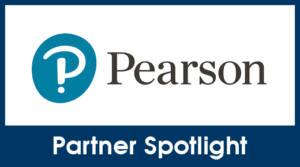 Written by: Dr. Laine Bradshaw, Vice President of Classroom Solutions, Pearson
Written by: Dr. Laine Bradshaw, Vice President of Classroom Solutions, Pearson
Throughout my career, I’ve had the privilege of listening to and learning from educators across the country. Over the past seven years, I’ve collaborated with these passionate professionals to create a classroom assessment and learning suite called Navvy, designed to address their most pressing challenges at the intersection of assessment, teaching, and learning.
The diverse ideas, strategies, and approaches that these educators bring to the table help to tackle the complex and ever-evolving challenges they face daily. In their quest to succeed with a wide range of students and expansive content, their perseverance serves as a gift to students, families, and society as a whole. These varied perspectives foster rich and productive discussions, or “discussuments” as my friend and colleague Andrew Izsák, Professor of Mathematics Education at Tufts University, fondly calls them.
The Power of Personalized Learning
While debates about educational solutions are plentiful, one common ground I’ve found among educators is the belief in the power of personalized learning for student success. Personalized learning means identifying a student’s specific needs in a subject or concept and tailoring instruction to address those needs, leading to more efficient and successful learning experiences.
The Four Key Stages of Personalized Learning
Facilitating personalized learning is iterative and can be simplified into four key stages of a formative assessment process:
- Plan: Create targeted plans for student learning.
- Teach: Facilitate tailored learning opportunities based on each student’s needs.
- Check Understanding: Gather information to determine whether students have achieved the learning objectives,
- Reflect: Analyze assessment results to inform future instruction.
A typical cycle may begin with planning primary instruction for an academic standard or a small set of standards, followed by providing instruction, assessing student understanding, and reviewing results to identify students who still need support. With personalized learning, subsequent cycles continue with targeted support based on individual student needs, refining instruction until the student learns what the standard requires.
The Implementation Challenge
While the concept of personalized learning is universally appealing, putting it into practice on a large scale remains elusive. Many educators feel they lack the necessary tools to implement personalized learning effectively. Two critical elements are often missing:
- High-quality classroom assessments
- High-quality instructional materials for targeted support
High-Quality Classroom Assessments
Classroom assessments play a crucial role in personalized learning as they provide evidence of student understanding. To be effective, classroom assessments must be (see Bradshaw, 2022):
- Timely: In-the-moment assessments with real-time results enable educators to keep pace with the personalized learning cycle and make informed instructional decisions.
- Detailed: Results should be specific enough to inform tailored learning activities at the level of individual academic standards or learning objectives.
- Accurate: High-quality assessments minimize the risk of misguiding instruction by providing reliable evidence of student proficiency.
These characteristics are not exhaustive, but they highlight common gaps in the assessment and instructional tools provided to educators. Other important factors include promoting high levels of student engagement, ensuring equitable access for all students, and fostering usability and efficiency within a broader teaching and learning ecosystem that supports healthy learning mindsets.
Seizing the Opportunity
As an advocate for high-quality classroom assessments and learning resources, I’ve dedicated years to studying research, evaluation, measurement, and statistics through my PhD program and in teaching doctoral students at the University of Georgia. Drawing from this knowledge and collaboration with educators, Navvy was created to fill gaps in tools available to educators today. I firmly believe that all students deserve educators equipped with the right tools to effectively personalize their learning experiences. Together, we can build and provide these essential resources.
To further explore the elements that make classroom assessments truly effective for personalized learning, we invite you to read our in-depth white paper.
References
Bradshaw, L. (2022). Empowering personalized instruction with a three-tiered approach to learning evidence [White paper]. Pearson. https://www.pearsonassessments.com/content/dam/school/global/clinical/us/assets/district-assessment/navvy-white-paper.pdf
